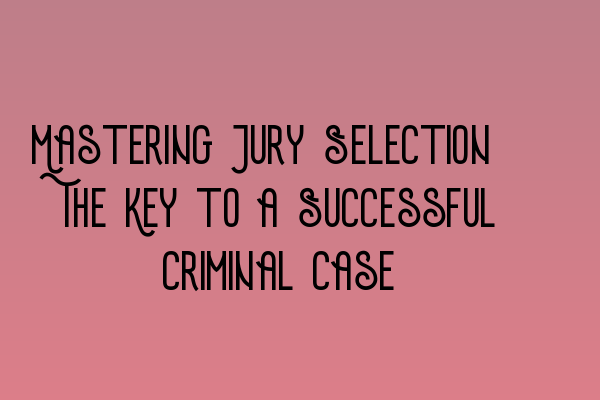Mastering Jury Selection: The Key to a Successful Criminal Case
Welcome to the SQE Criminal Law & Practice Law UK blog! In today’s post, we will explore the importance of jury selection in criminal cases and how mastering this process can significantly impact the outcome of a trial.
The Significance of Jury Selection
Jury selection, also known as voir dire, is the process through which attorneys choose the individuals who will sit on a jury and ultimately decide the fate of the defendant. This crucial phase requires a strategic approach, as the selection of unbiased, fair, and open-minded jurors can greatly influence the trial’s outcome.
Effective jury selection involves a thorough understanding of the case, meticulous preparation, and the ability to assess and analyze potential jurors. By carefully examining their backgrounds, beliefs, and experiences, attorneys can identify jurors who are likely to be sympathetic to their client’s case.
It is important to remember that not all jurors are created equal. Some may have inherent biases or preconceived notions that could impact their ability to fairly judge the evidence presented during the trial. By identifying and eliminating such individuals during the selection process, attorneys can stack the jury in their client’s favor.
The Key Steps in Mastering Jury Selection
To effectively master jury selection, attorneys must follow a series of key steps:
- Case Preparation: Thoroughly review the case details, including evidence, witness testimonies, and legal arguments. This will allow you to identify potential biases or issues that may arise during jury selection.
- Define the Ideal Juror: Create a profile of the ideal juror based on the specific circumstances of your case. Consider factors such as age, occupation, life experiences, and personal beliefs that may align with your client’s interests.
- Questioning Strategies: Develop a list of strategic questions to gain insight into potential jurors’ biases and attitudes. Use open-ended questions that encourage honest and detailed responses.
- Observe Non-Verbal Cues: Pay attention to jurors’ body language, facial expressions, and reactions throughout the selection process. Non-verbal cues can provide valuable insights into their potential biases.
- Challenges for Cause: Identify jurors who demonstrate clear biases or prejudices that could hinder their impartiality. These individuals can be challenged for cause, meaning they can be disqualified from serving on the jury.
- Peremptory Challenges: Utilize peremptory challenges to remove potential jurors for reasons that may not be explicitly biased but have the potential to affect the trial outcome. It is crucial to exercise these challenges carefully to avoid allegations of discrimination.
- Build Rapport: Establish a connection with potential jurors during questioning. Building rapport can help you better understand their perspectives and potentially influence their decision-making.
- Monitoring the Jury: After the jury is selected, closely observe their behaviors and reactions throughout the trial. This allows you to make informed decisions regarding your trial strategy.
Maximizing Your Success with Jury Selection
In order to maximize your success with jury selection, it is essential to remain diligent, adaptable, and well-prepared. Regularly honing your skills and staying up-to-date with the latest legal strategies can significantly enhance your ability to select a favorable jury for your client.
If you’re preparing for the SQE Criminal Law & Practice Law exam, be sure to check out our related articles:
- SQE 1 Practice Exam Questions
- SQE 1 Practice Mocks FLK1 FLK2
- SQE 2 Preparation Courses
- SQE 1 Preparation Courses
- SRA SQE Exam Dates
Remember, mastering jury selection requires a combination of legal knowledge, analytical skills, and the ability to effectively communicate with jurors. By investing time and effort into this crucial phase of a criminal case, you can significantly increase your chances of achieving a successful outcome for your client.
Thank you for reading our blog post. We hope you found it informative and useful. Stay tuned for more content related to criminal law and legal practice.
